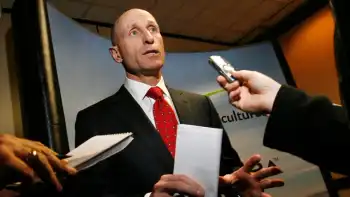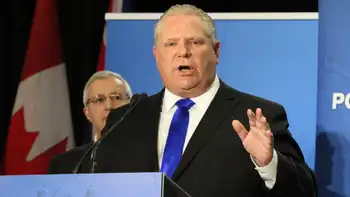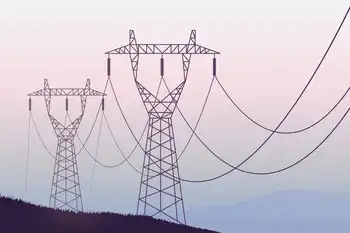Argentina Calling Companies to Task
BUENOS AIRES -- - TWO years after the economy here collapsed, Argentines are still tallying their losses. But in a departure from past practice, President Néstor Kirchner is insisting that companies that reaped windfall profits here in the 1990's share today's pain by fulfilling contracts they now see as burdensome, rather than sticking customers with the tab.
Since taking office in May, Mr. Kirchner has helped the economy inch toward its first year of growth in nearly six years, and he has done so in part by showing strong sympathy for the Argentine consumer, whose standard of living and purchasing power have been severely eroded by the economic crisis.
The Kirchner government has appointed members of consumer advocacy groups to government regulatory bodies, passed laws that have prevented widespread mortgage foreclosures and made it easier to make and prescribe generic drugs.
But the main targets of his campaign have been companies - as diverse as electricity, light, gas and water utilities and airport operators and postal services - that were privatized a decade ago and sold mostly to Europeans when Carlos Saúl Menem was in power.
The Kirchner government has revoked some contracts, saying the companies did not fulfill obligations, and it has put others up for new bids. It is reviewing the rest. "When you are offering public services, you have to deliver that service properly," Mr. Kirchner warned a month ago. "You have to invest, comply with the contracts and have mechanisms that guarantee the quality of the service."
That set off a battle that is sure to spill into 2004. The International Monetary Fund and various European prime ministers are pressing Mr. Kirchner to grant significant rate increases to utilities, and several utilities are suing Argentina in foreign courts, contending breach of contract. But the government here has maintained that higher rates will be granted only after the contract reviews and if no violations are found.
Although company experiences varied during the bonanza years of the 1990's, the case of the French-controlled water and sewage utility Aguas Argentinas is perhaps emblematic. During the first five years of the 30-year concession the company was awarded in 1993, its spending fell more than $600 million short of the $1.45 billion that it was obliged to invest, the government calculated.
"They had obligations, and they simply did not comply with them, this in spite of the fact that they received all sorts of subsidies and were granted rate increases,'' said Jorge Delhon, a lawyer who was recently appointed to the water regulation board here.
Aguas Argentinas and all of the major privately owned utilities operating in Argentina were asked to comment on the rate dispute. Most did not return repeated telephone calls, and those that did said they were under orders from their home offices not to discuss the situation.
But in an interview in Paris with Argentine reporters in late October, the director of operations of Electricité de France, owner of the electricity utility Edenor, castigated the Argentine government's position. Edenor last year sought a 37 percent rate increase as compensation for 2002 losses of 307 million euros, or $322 million, but it got only 10 percent, and an Argentine court promptly tabled that.
"It is not with an injection of capital from France that the debt will be put in order," said the executive, Gerard Creuzet. "Each activity of the group has to be profitable in each country" and "without new investment, the network will be debilitated and there will be operational problems in the future."
IN theory, government regulatory agencies should long ago have focused on the contract violations the Kirchner government has uncovered. But most of those agencies did not have real autonomy, reporting instead to Mr. Menem, and were run by appointees from the very industries they were supposed to oversee. Contracts were often renegotiated on terms that were even more favorable to the utility.
"The whole system was subjected to the whims of the government then in power," said PatrÃcia Vaca Narvaja, a former director of a leading consumer advocacy group who is now an official of the government's Secretariat for Competition and Consumer Defense. Utility companies also reaped a bonanza from a practice that called for utility tariffs to be adjusted by the rate of inflation in the United States. A 1990 law pegging the value of the peso to the dollar at one to one prohibited such indexing. Since the Argentine economy was experiencing deflation in the 1990's and the promise of reducing rates was also forgotten, the rate adjustment swelled profits enormously. According to calculations of the economic research unit led by Daniel Aspiazu at the Latin American Faculty of Social Sciences here, Argentine consumers paid an extra $10 billion to utilities as a result of that provision.
Rather than reinvesting their Argentine profits here to meet contractural targets for expansion and improvement of service, utilities mostly repatriated profits to parent companies. Then they borrowed abroad in dollars, which proved disastrous when the economy collapsed in 2001, and the government let the peso float against the dollar.
Most utilities are now heavily indebted, with cumulative debt estimated at more than $6.5 billion, and they are pushing for relief on the grounds that they are losing money. But the Kirchner government replies that every utility continues to show operating profits and argues that the companies, not the consumer, should pay for bad business decisions.
Related News

NEW Hydro One shares down after Ontario government says CEO, board out
TORONTO - Hydro One Ltd. shares slid Thursday with some analysts sounding warnings of greater uncertainty after the new Ontario government announced the retirement of the electrical utility's chief executive and the replacement of its board of directors.
After sagging by almost eight per cent in early trading on the Toronto Stock Exchange, shares of the company were later down four per cent, or 81 cents, at $19.36 as of 11:42 a.m. ET.
On Wednesday, after stock markets had closed for the day, Ontario Premier Doug Ford announced the immediate retirement of Hydro One CEO Mayo Schmidt. He leaves with a $400,000…




